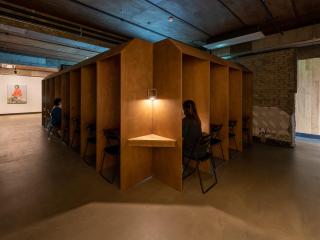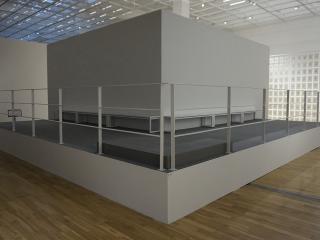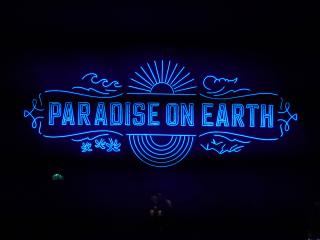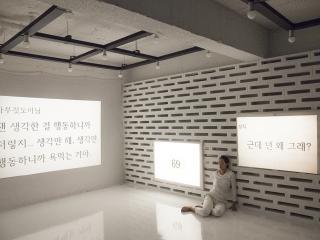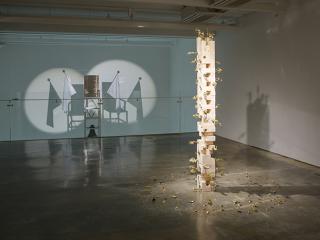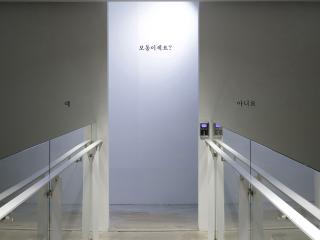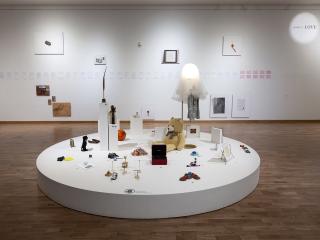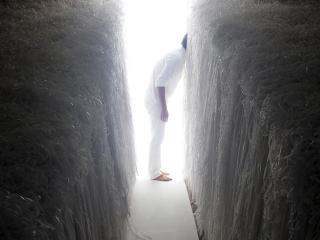project 대화 Vol.4
우리가 모르는 우리(2019~) Our Unknown Country
2009년 부터 진행중인 project 대화의 4번째 주제는 '우리가 모르는 우리', 공동체 집단의 이야기이다. 지난 프로젝트들에서 '꿈', '사랑', '보통'과 같이 평범함 사람들이 살아가면서 뜻하지 않게 잃어버리는 것(상실)과 잊어버리게 된 것(망각)에 대해서 말하며 삶에서 의미 있는 것들에 대해 성찰하게 하는 프로젝트들이 '보통'을 거쳐 자연스럽게 4번째 프로젝트 <우리가 모르는 우리>로 이어진다. 개인이 개인됨을 상실하도록 정당화하고 보호막이 되어준 가족을 비롯한 집단이 숨기고 싶어하고 애써 부정하는 모습들과 부조리, 부작용들에 주목하고자 한다.
결국 개인의 희생을 발판삼아 존재하는 집단이 개인들에게 약속하던 더 나은 삶과 미래, 정의로운 사회는 어떻게 실현되고 있는가. 그런데 그렇게 어렵게 만들어온 '우리'는 왜 행복하지 않을까.
그리고 나는 여전히 왜 우리가 아니라 나이어야만 하는 걸까.
* 이번 작품은 국립현대미술관의 <올해의 작가상2019> 전시에서 발표했습니다.
* '당신의 우리는 누구인가?' 설문은 2024년까지 총 6,000명이 참여했으며, 이 설문을 통계 분석하여 해석된 작품들을 2026년 개인전으로 발표할 계획입니다. (2026년 9월 금호미술관 예정)
작가노트 Full Version ▶
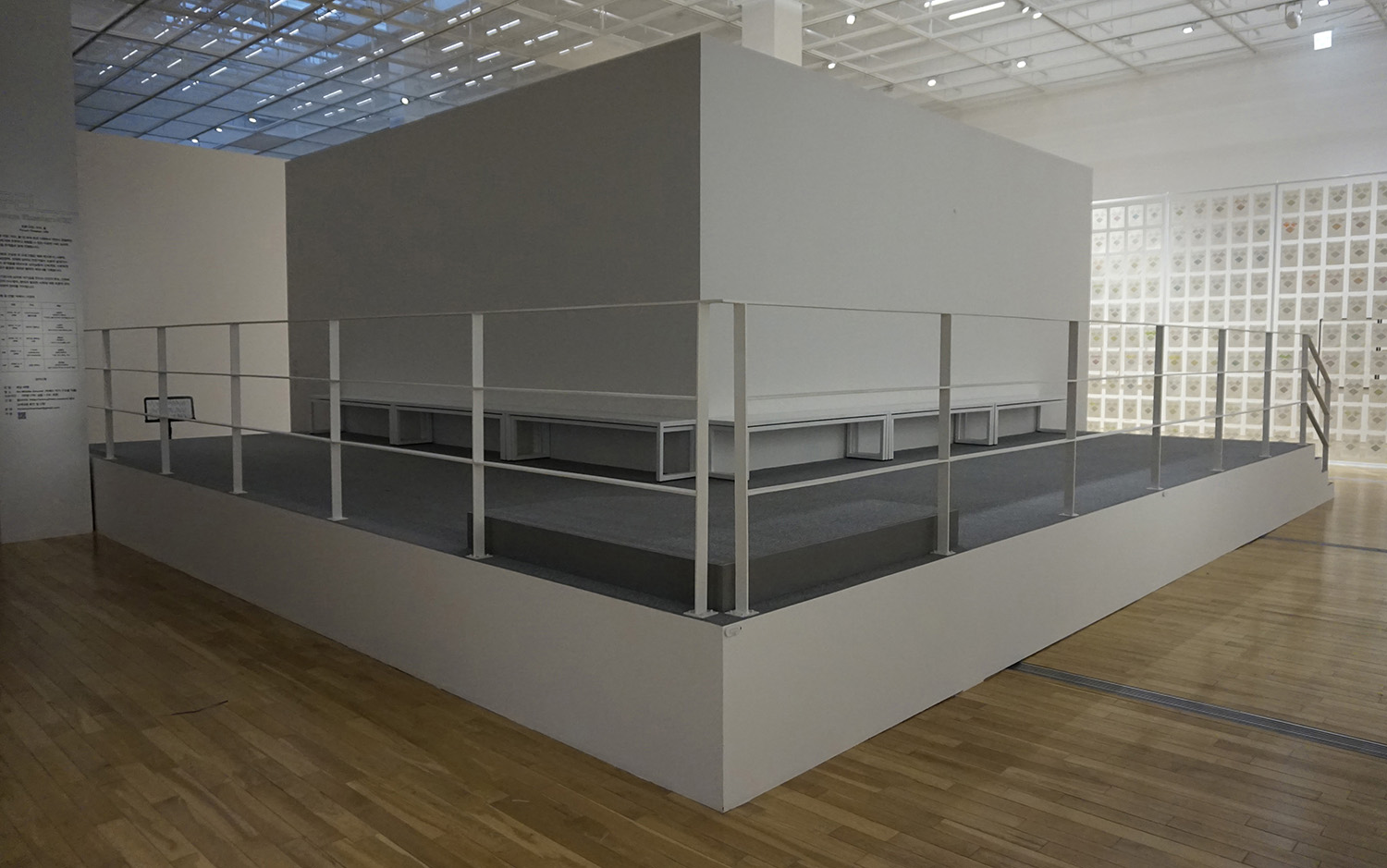
No Middle Ground (Back), 2019, 900x900x350cm
Our Unknown Country, the fourth part (Vol. 4) of the Project Dialogue which was launched in 2009, takes ‘discourse on community’ as its theme. The first two parts that were to reflect on valuable things in life by talking about what ordinary people tend to lose and forget unintentionally, such as ‘dream’ and ‘love’, developed into ‘Botong,’ and they were led to the fourth project Our Unknown Country.
This project focuses on irrationality and negative influence as well as aspects that a community including family, who justifies the loss of individuality of a person by providing protection, tries to avoid and deny.
Are a better future and just society promised by a community founded upon the sacrifice of individuals ever coming true?
Then why are the precious 'us' not happy yet?
And why should I be still ‘me,’ not ‘us’?
* These works were presented at MMCA's <Korea Artist Prize 2019> exhibition in Seoul.
* A total of 6,000 people participated in the Who Are We? survey by 2024, and the works interpreted through statistical analysis of this survey are scheduled to be presented at a solo exhibition in 2026. (Scheduled for September 2026 at the Kumho Museum of Art)
(English translation by. Mingyoung Lee_2nd draft July 2020)
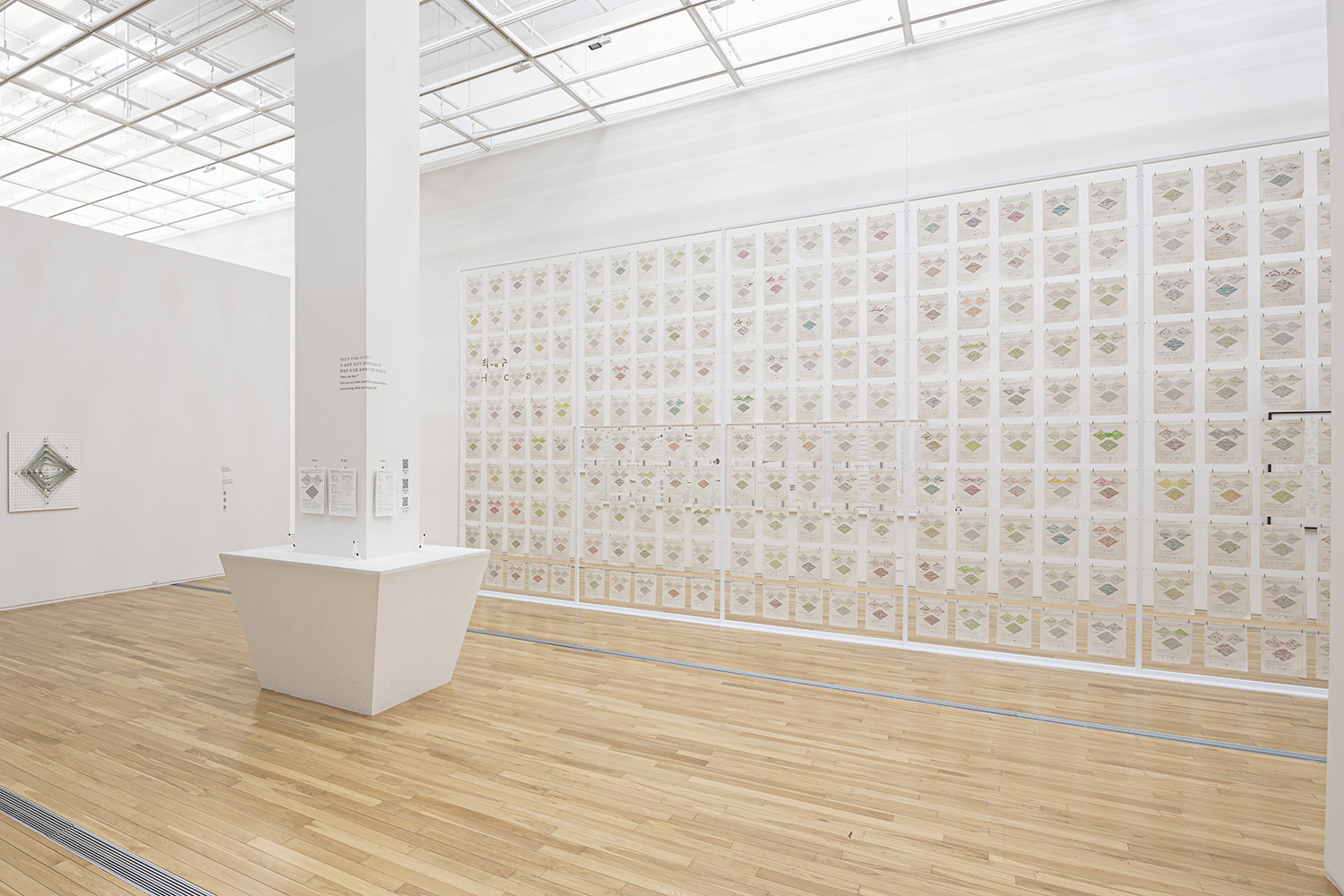 설문 '당신의 우리는 누구인가?'. 2019, 300명 중산층 모집단 답변지, 800x350(h)cm, 반유화(정신과전문의) 협업.
설문 '당신의 우리는 누구인가?'. 2019, 300명 중산층 모집단 답변지, 800x350(h)cm, 반유화(정신과전문의) 협업.
Survey 'Who Are We?', 2019, 300 participant answers of middle class, 800x350(h)cm, co-researcher Bhan Yoo-wha(psychiatrist).
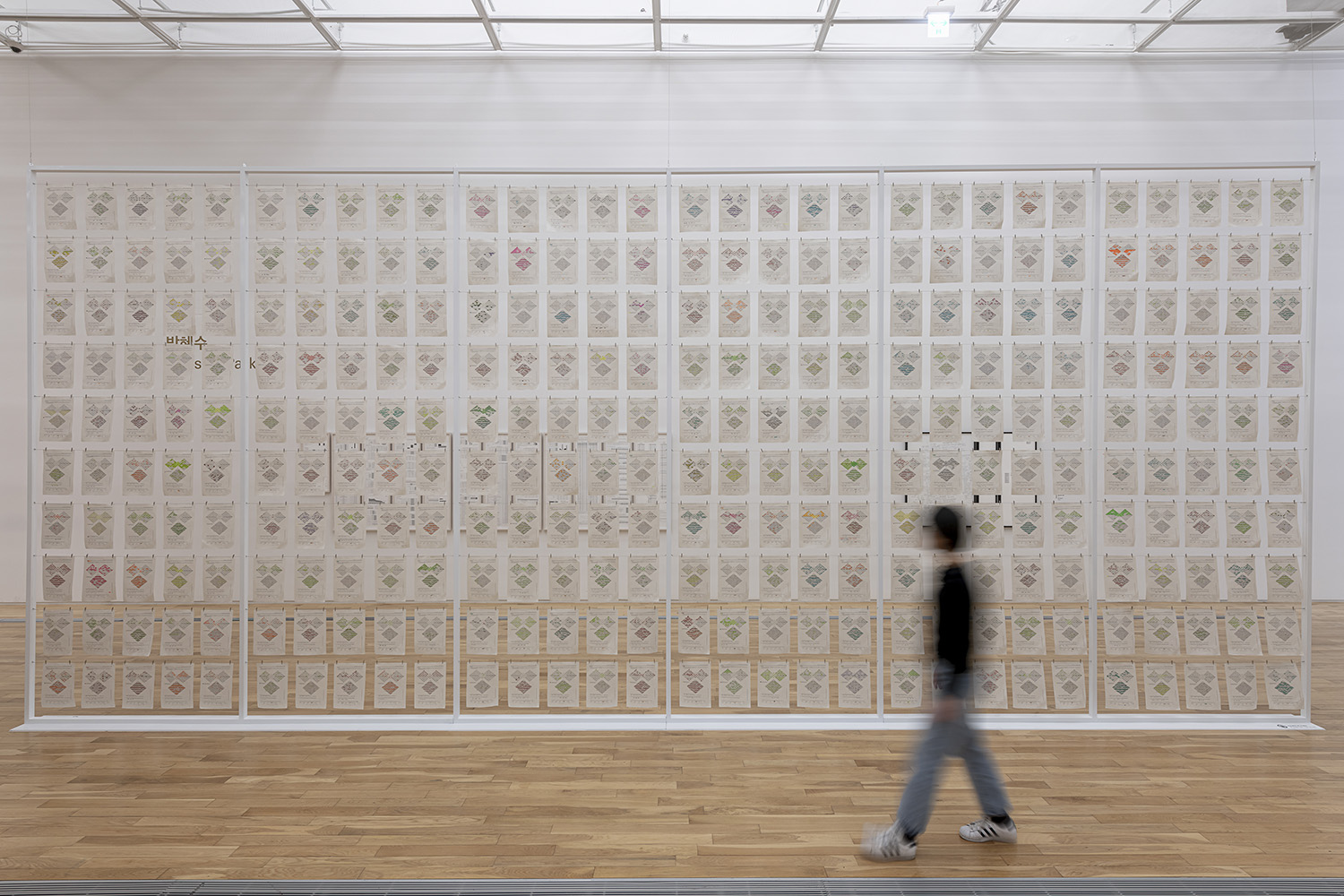
나는 한국사회에 내재단 개인과 사회에 관한 보편적 개념과 가치를 다양한 시각에서 들여다보았다. 이번 신작은 개인들이 생각하는 '우리'에 대한 정의와 범주 즉, 이들이갖는 집단에 대한 인식을 살펴보고자 한다.
I looked into the universal ideas and values about individuals and society inherent to the Korean society from different perspectives. This new project (Vol. 4) examines how individuals define and categorize 'us' and how they perceive the idea of community
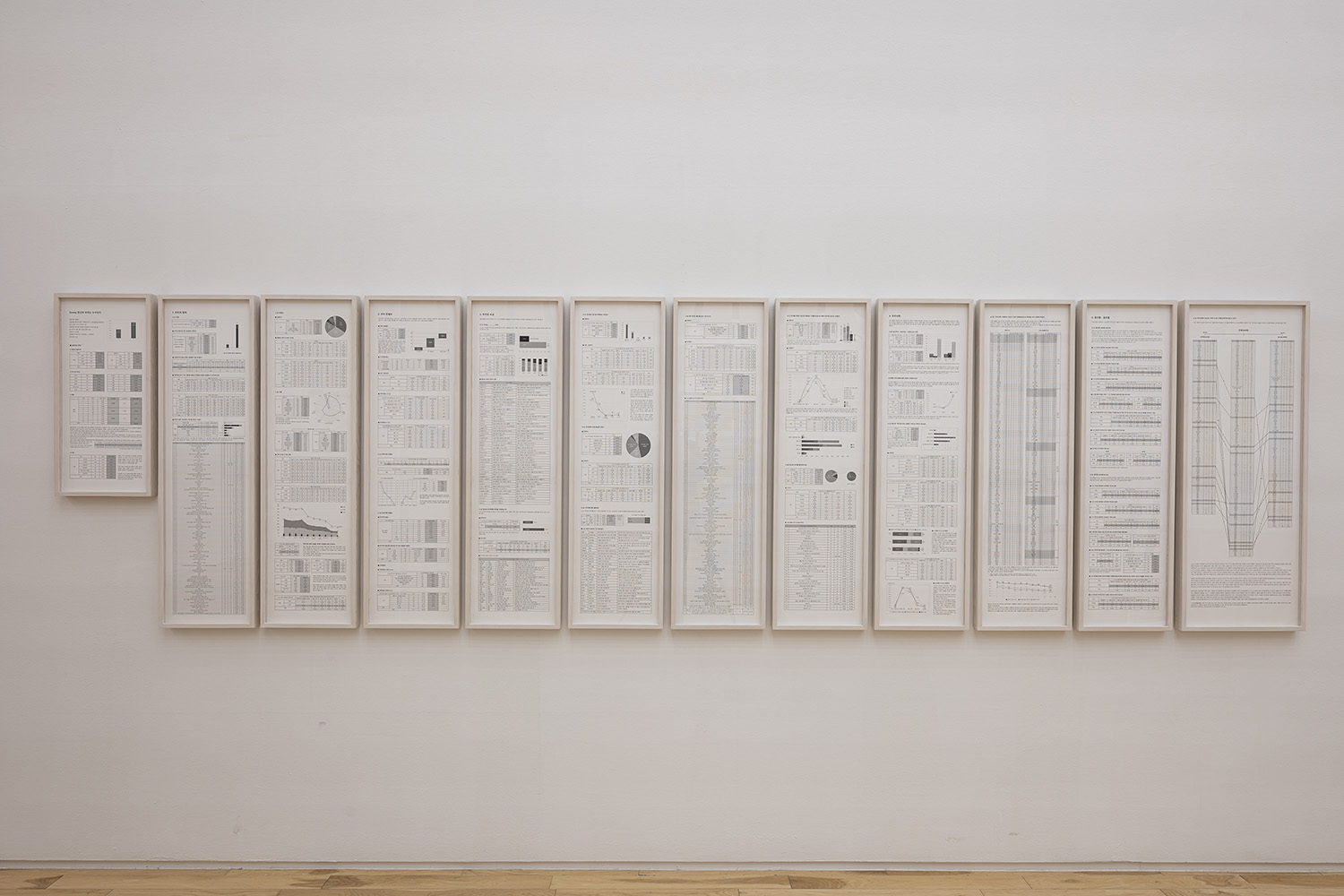
설문 보고서 ‘당신의 ’우리‘는 누구인가?, 2019, C_print_30x 66(h)cm, 30x110cm(h), 40x110(h)cm, 수원시립미술관 소장
Survey Report ‘Who Are We?’, 2019, 2019, C-Print_30x 66(h)cm, 30x110cm(h), 40x110(h)cm (total 12pieces), Suwon MoA Collection
설문 '우리는 누구인가?'는 개인들이 생각하는 ’우리‘에 대한 조사로 표본집단 507명을 대상으로 ‘우리’ 의 정체성에 대한 인식을 조사했다.
설문은 개인들이 생각하는 ’우리‘ 라고 불리는 집단의 범위와 갖추어야 할 조건을 묻는 질문으로 사람들에 대한 ’우리‘의 범위를 도형으로 살펴볼 수 있는 특징이 있다.
중산층(300명)을 모집단으로 전시장에 직접 전시하고 관객들의 역시 동일한 설문을 진행할 수 있다. (우리 친밀도 검사-사진 아래)
The survey Who Are We? aims to see what does ‘us’ mean to an individual, thus asked a group of 507 people questions related to how people perceive the identity of 'us.' This survey asks them about what defines and qualifies 'us,' and is presented with graphs that show the range of ‘us.’ The survey conducted to 300 people from the middle-class is displayed in the exhibit space where the audience could answer the same questionnaire.
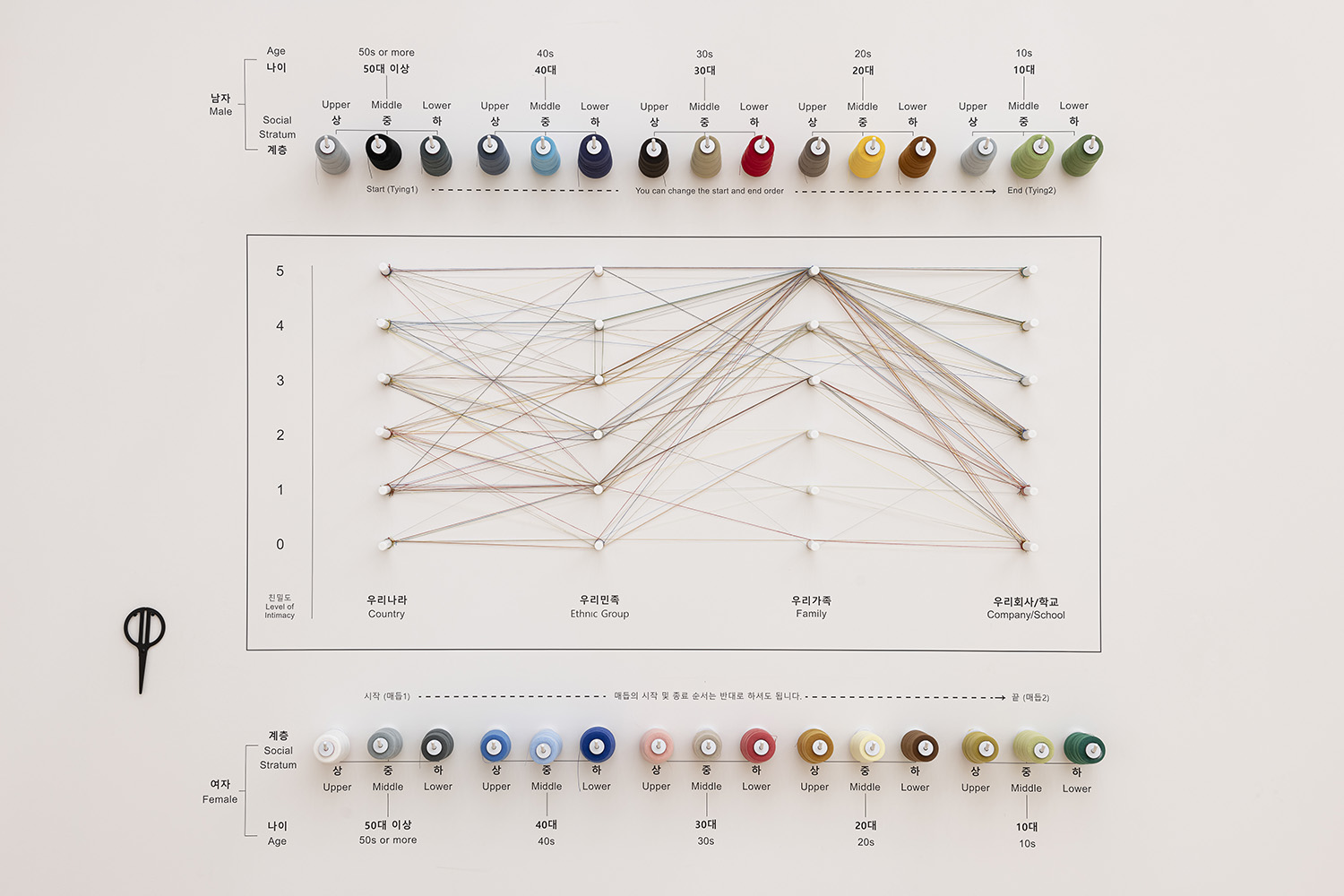 우리친밀도 검사, 2019, 실, 텍스트, 가변크기, 관객참여설문
우리친밀도 검사, 2019, 실, 텍스트, 가변크기, 관객참여설문
The Test of Intimacy about Us, 32 color threads, text, variable dimension, audience participation survey
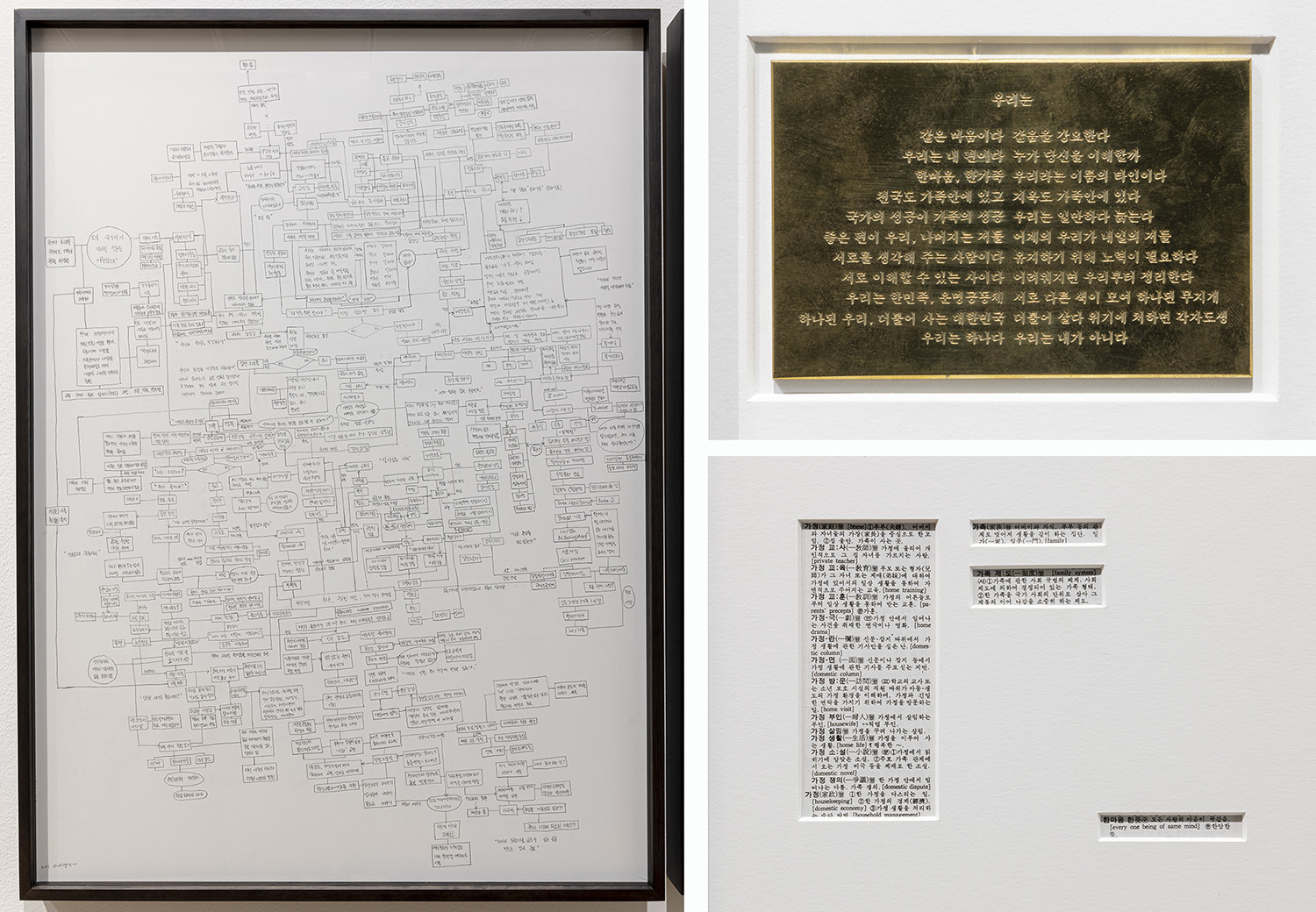
청사진 '우리', 2019, 종이위에 연필, 79x110cm / 우리 선언문, 2019, 황동위에 글씨 조각, 15x10cm / 무제, 2019, 사전, 40x 110cm
Blueprint 'URI', 2019, pencil on paper, 79x110cm / Declaration of URI, text carving on brass plate, 15x10cm / Untitled, 2019, dictionalry, 40 x110cm
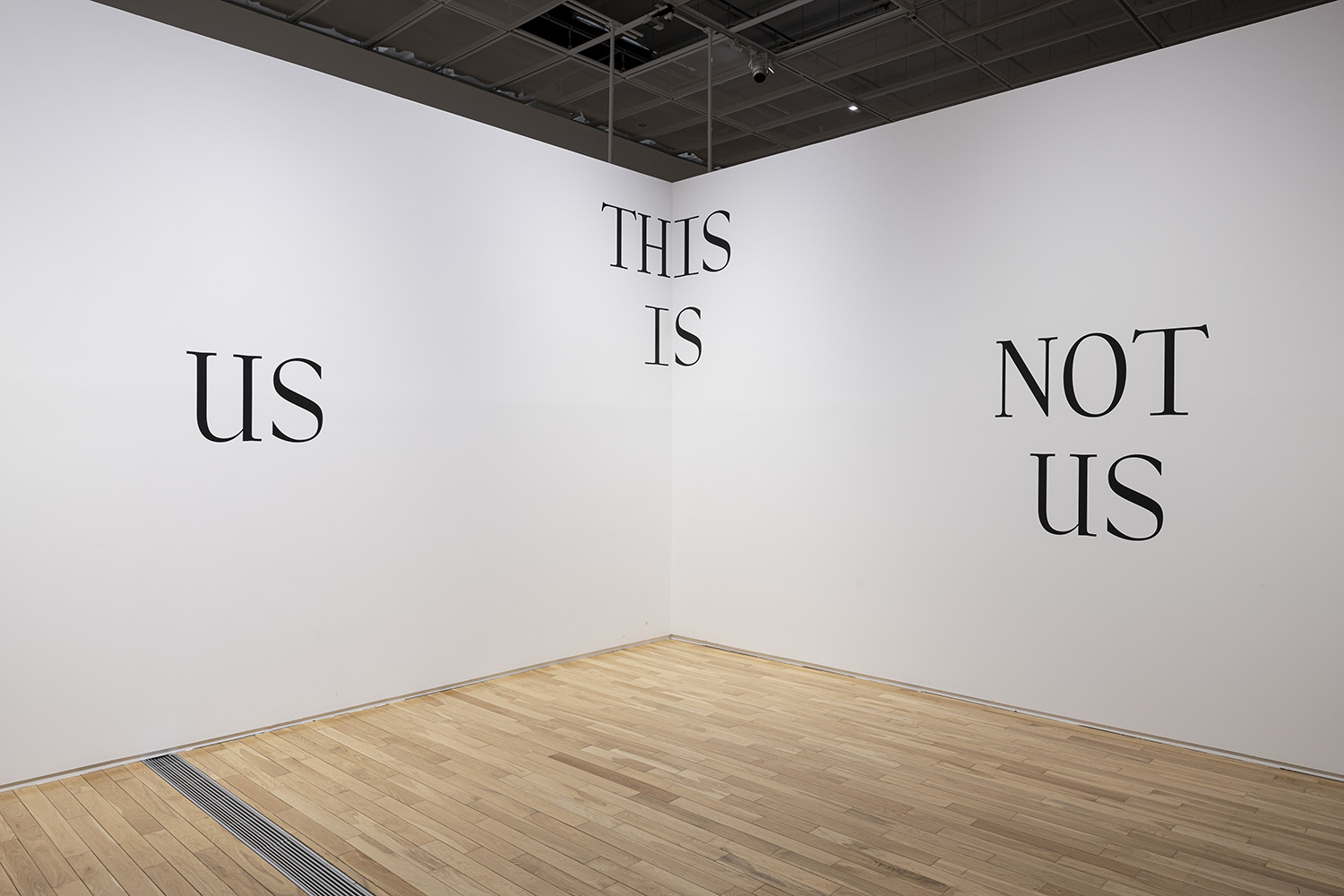 No Middle Ground, 2019, Structure work, text, 900x900x350(h)cm
No Middle Ground, 2019, Structure work, text, 900x900x350(h)cm
한국의 양극화 사회의 모습을 담은 구조물 작품으로, 구한말 남녀를 구분하기 위해 ㄱ자로 지어진 초기 교회인 김제의 ‘금산교회’의 구조에서 모티브를 따왔다. 정면의 ‘This is us, This is not us’란 문구가 말하듯이 양극화 사회에서 자신의 주장들만을 내세우는 갈등의 모습을 건축적 형태로 제안한다.
This structured piece embodies the polarization of Korean society. This work was inspired by the Geumsan Church in Gimje, which was built as an L-shaped structure to separate men and women in the late period of Joseon (around 1908). As the phrase "This is us, This is not us" written on the front, this architectural form represents the state of discord where people only insist on their opinions in a polarized society.

금산교회(김제) Geumsan Church(1908~) , Gimje City, KR, 사진출처: Google
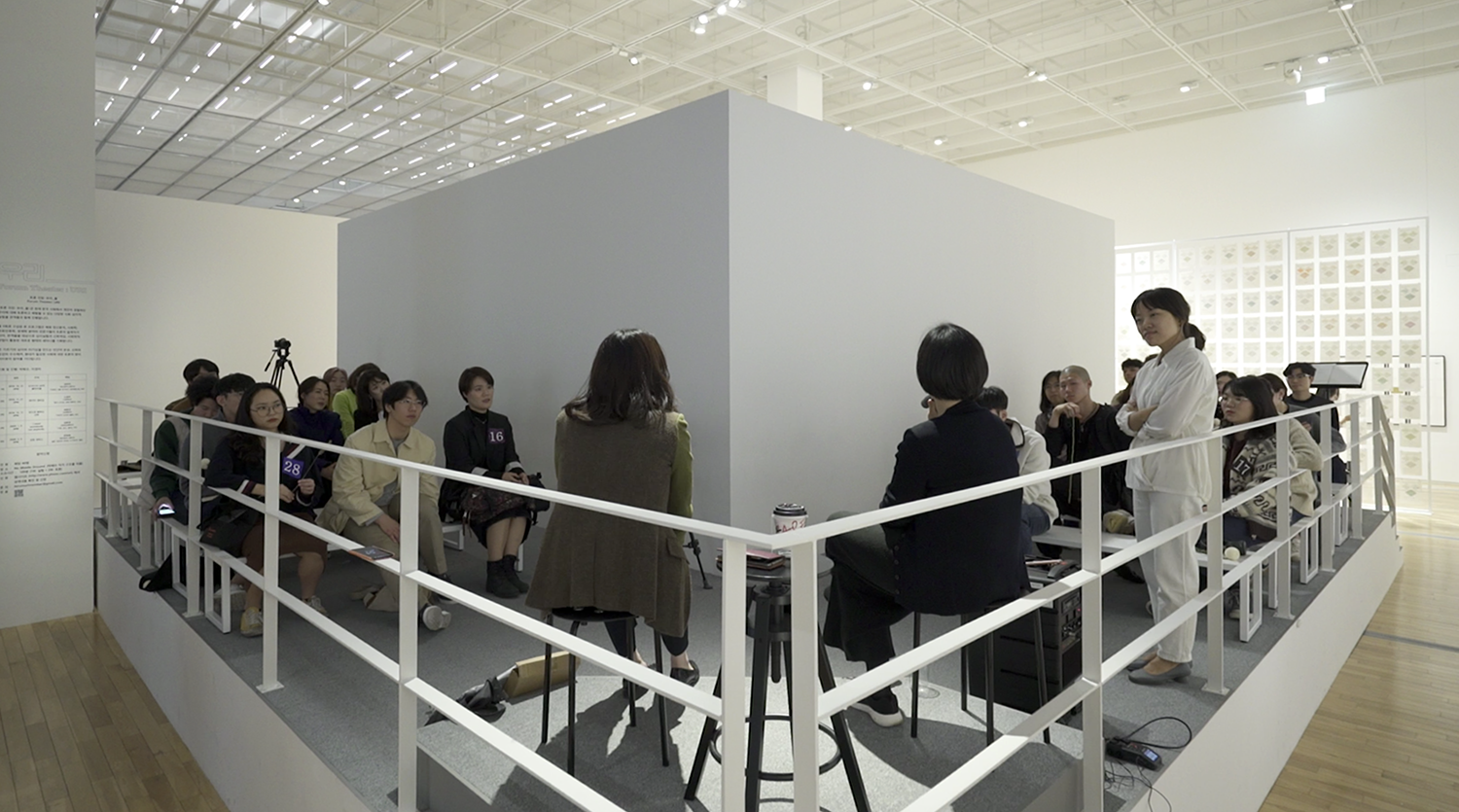 토론극장 ‘우리_들’, 2019_협업 기획: 이경미 / Forum Theater URI, 2019, co-director Lee Mia-kyungmi
토론극장 ‘우리_들’, 2019_협업 기획: 이경미 / Forum Theater URI, 2019, co-director Lee Mia-kyungmi
설문 ‘당신의 우리는 누구인가’ 해석과정에서 주목하는 5가지 이슈를 가지고 구조물 작품<No Middle Ground>에서 진행되는 토론과 퍼포먼스가 결합된 형식의 프로그램으로, 심리, 사회, 경제, 문화인류학 등 다양한 전문가들을 패널로 초청하여 관련 주제에 대해 토론하는 시간을 진행한다.* 타이틀 ‘우리_들’은 ‘우리와 저들’의 축약으로 가까운 ‘우리’에 비해 가까이 하기 힘든 ‘우리들’을 의미한다.
Forum theater ‘URI’ is a combined form of discussion (lecture) and psychology theater that takes place on the structured piece No Middle Ground about the 5 important issues that arose during the interpretation of the survey Who Are We? . Experts of various areas such as psychology, sociology, economy, and cultural anthropology were invited as the panel to discuss the related issues.
More Forum Theater: URI
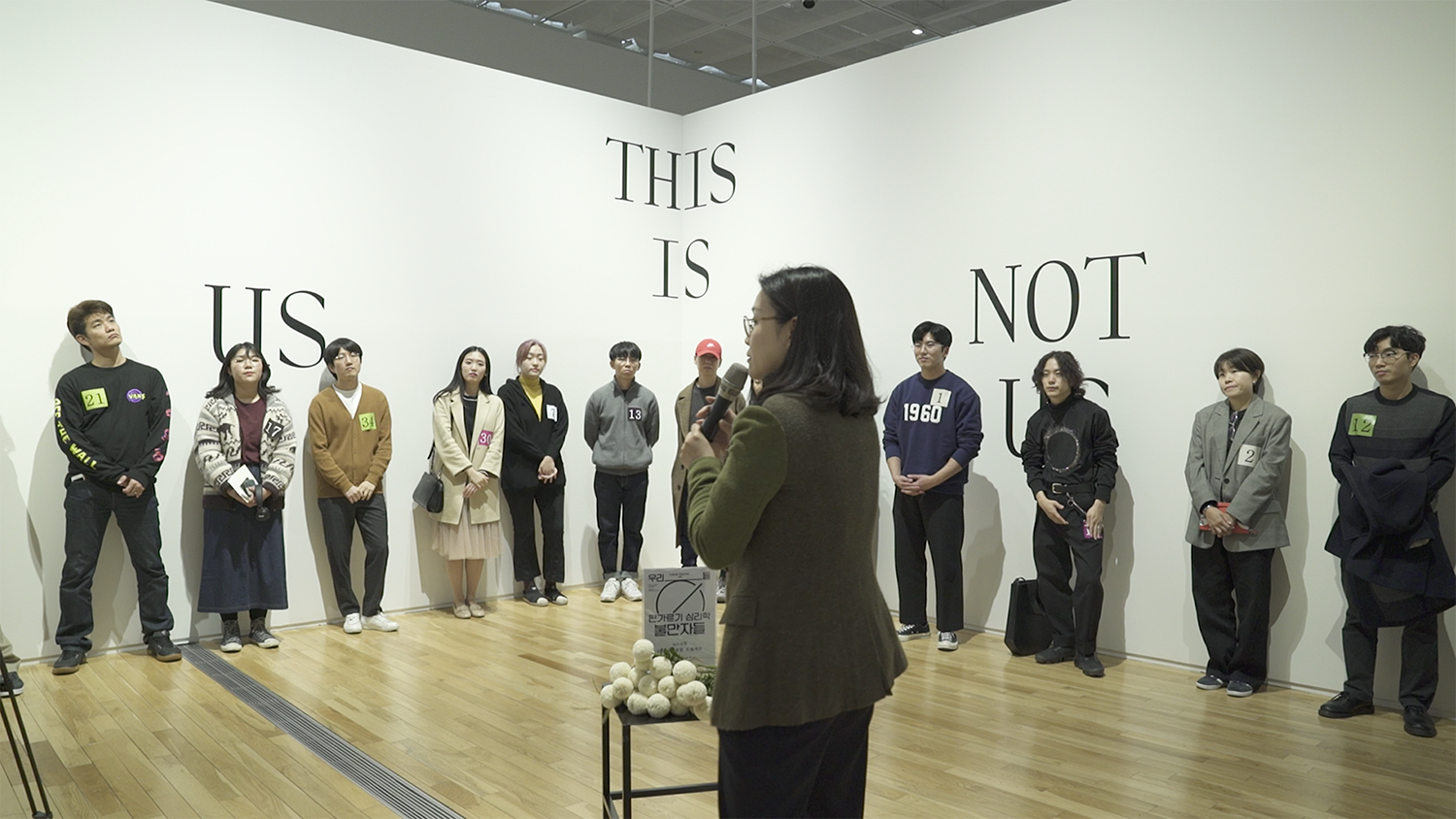
#1막: 편가르기 심리학-불만자들(설계자: 성유미) #1 Splitting(by. Sung Yu-mi / Psychiatrist)
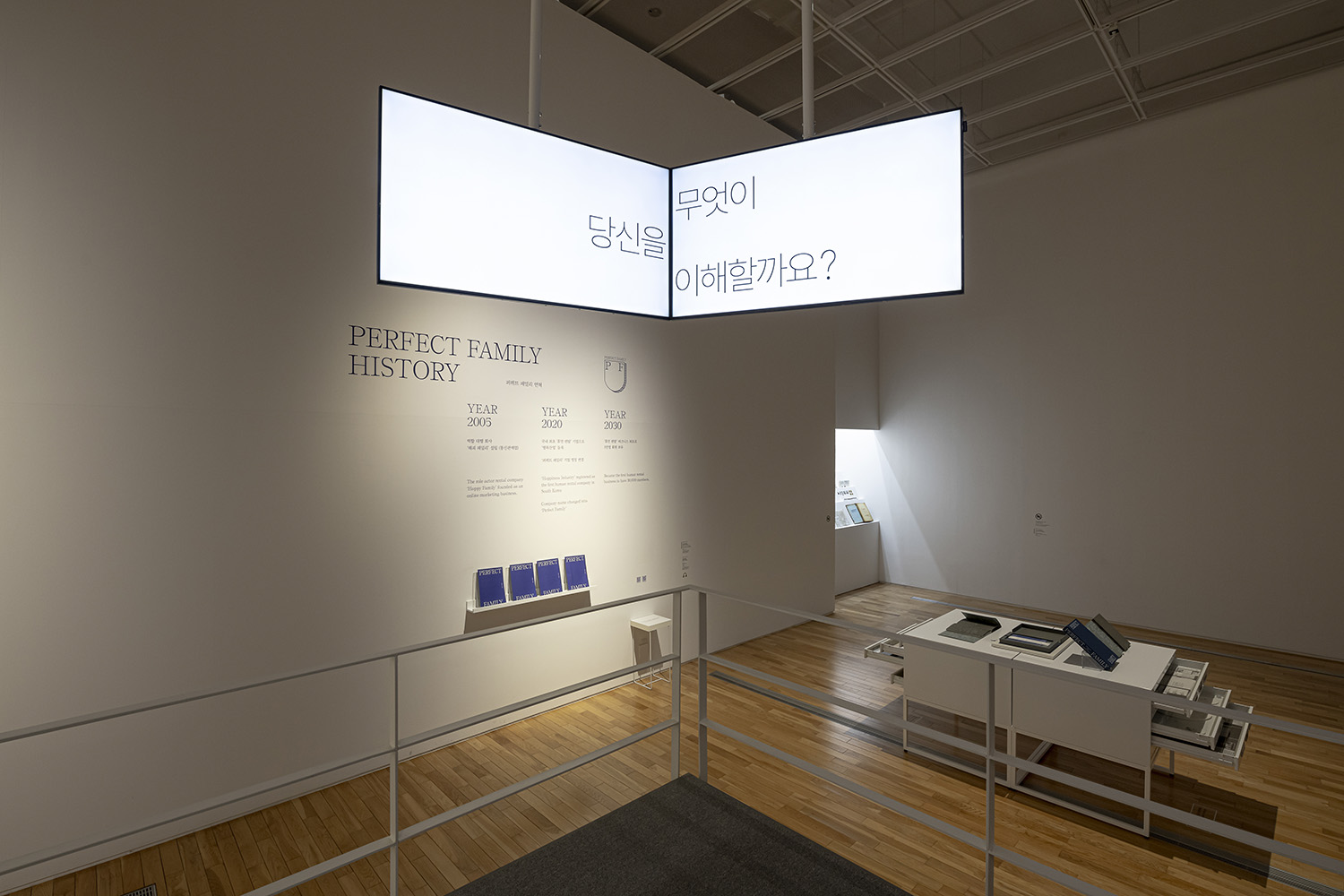
OURS, 2019, 2채널 영상, 09:40, 영상디자인: 서문홍익
OURS, 2019, 2 channels, 09:40, Text designed by Seomoon Hong-ik
Family 家族
한국인들은 자신의 가족을 일컬을 때 ’우리‘란 말을 흔히 사용한다. 실제 이번 설문에서도 가족은 ’국가, ‘민족’, ‘회사’ (학교)에 비해 월등히 높은 친밀도를 나타내며 대한민국 사회에서 유일하게 강력한 영향력을 발휘하는 ‘우리’이다.
무슨 일이 있어도 끝까지 자신을 지켜줄 것이라 믿는 존재이지만 역설적이게도 자본에 의해 빠르게 해체되어 2015년 전체 가구의 1/3이 1인 가구일 정도로 한국사회는 이미 무연사회*에 진입했다. ‘과연 절대적으로 신뢰하는 ‘가족’은 나를 지켜줄까.‘ 가족 역시 철저한 자본주의 질서 아래 있다는 사실을 확인하는 곳이 바로 가족의 죽음을 맞이하는 곳이다. 신문 부고 기사만 보아도 고인의 애도는 간 곳 없이 가문의 허세만 가득하다. 가난하든 부자든 간에 죽음의 장소엔 가족의 민낯이 드러난다.
When Koreans refer to their family, they often say “our” family. In this survey as well, family demonstrated a significantly higher level of closeness than “nation,” “ethnicity,” or “work (school),” remaining the only “us” with a strong influence in Korean society.
People believe that family will always protect them, no matter what. Ironically, however, the family unit has rapidly disintegrated under the influence of capitalism. By 2015, one-third of all households in Korea consisted of single-person families, suggesting that Korean society is already becoming a “no-relationship society.” Can the family, in whom we place unconditional trust, truly protect us until the end?
Korean funeral culture clearly reveals that family, too, is strictly governed by capitalist values. Even in obituaries, genuine mourning is rarely found; instead, they are filled with pretentious remarks about the family. Whether rich or poor, the place of mourning exposes the reality of the family.
*No-relationship society (無緣社會 MUEN-SHAKAI): A society in which relationships between people gradually weaken due to an increase in unmarried individuals, prolonged economic recession, high youth unemployment, low birthrate, and an aging population.
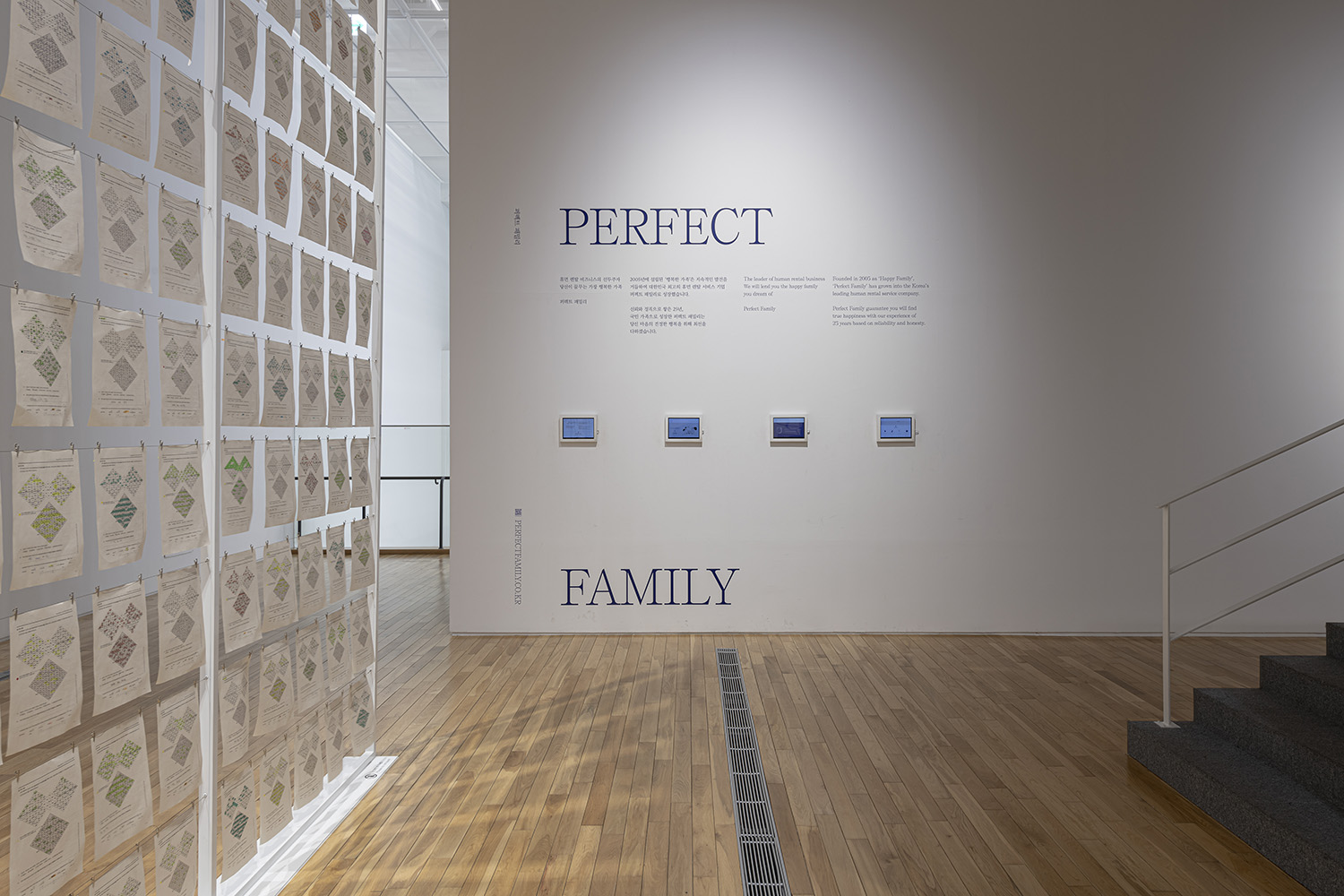 ㈜퍼팩트패밀리_월 텍스트, 그래픽, 트라이비전, 홈페이지_가변크기_디자인: 윤현학, 일러스트: 최보연, 국립현대미술관 소장
㈜퍼팩트패밀리_월 텍스트, 그래픽, 트라이비전, 홈페이지_가변크기_디자인: 윤현학, 일러스트: 최보연, 국립현대미술관 소장
Perfect Family, Inc, .2019, wall text, graphic, tri-vision, homepage, variable size, Design by Ted Hyunhak Yoon & Illustration by Boyeon Choi,, MMCA Collection
한국 사회의 허례허식은 결혼식과 장례식에서 극을 달한다. 아무리 작고 검소한 결혼식과 장례식을 원한다고 해도 이미 결혼식과 장례식은 개인이 아닌 가족의 일이다.
문제는 체면과 타인의 평판을 지나치게 신경 쓰는 문화가 가족과 친구를 대여하는 사업으로 이어지고 돈으로 산 지인들의 축하와 위로를 받는 일도 낯설지 않다.
Weddings and funerals are where needless formalities and vanity prevalent in Korean society dramatically manifest. Even if someone wants a simple and intimate wedding or funeral, one cannot decide anything because those are family occasions.
The way we care too much about reputation has led to the emergence of 'human rental' business, and it is not uncommon that the 'rented' friends and family members show condolences and congratulate someone.
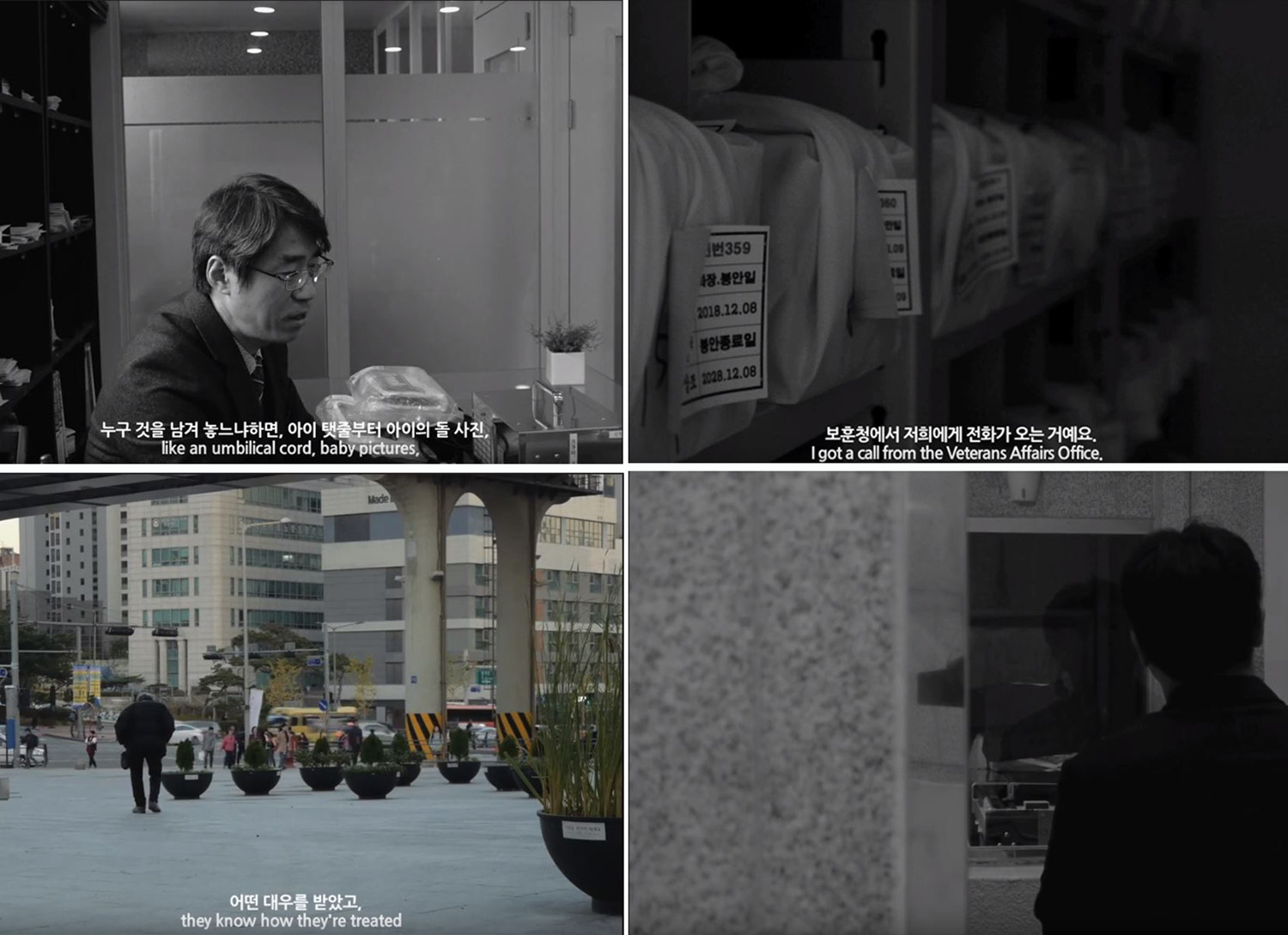
후손들에게, 2019, 싱글채널, 40분, 이원영(감독) 협업, 국립현대미술관, 부산현대미술관 소장
To Future Generations, 2019, single channel, 40:00, co-directing Lee Weon-young, MMCA, Busan MoCA Collection
영상작품은 4명의 유품정리사와 3명의 장례 지도사, 2명의 사회운동가의 인터뷰를 바탕으로 무연고 사망자들의 죽음과 관련된 장소(집, 장례식, 영안실 및 화장터)들을 교차로 보여주면서 가족의 부조리와 해체에 대한 질문을 하고자 한다.
’우리‘의 마지막 수로자로 믿고 있는 가족의 붕괴는 이미 진행 중이며, 쓸쓸히 홀로 죽은 이들의 마지막 유언을 베르톨트 브레히트 ’후손들에게’ 낭독을 통해 대변하고자 했다.
Based on interviews with four keepsake organizers, three funeral directors, and two social activists, the video To Future Generations explores the irrationality and disintegration of the family by presenting places—such as houses, funeral homes, mortuaries, and crematoriums—associated with deceased individuals who had no family or friends to contact.
The collapse of the family, once considered the last guardian of “us,” is still ongoing. The work seeks to represent those who died alone and their final wishes by reciting Bertolt Brecht’s To Future Generations.
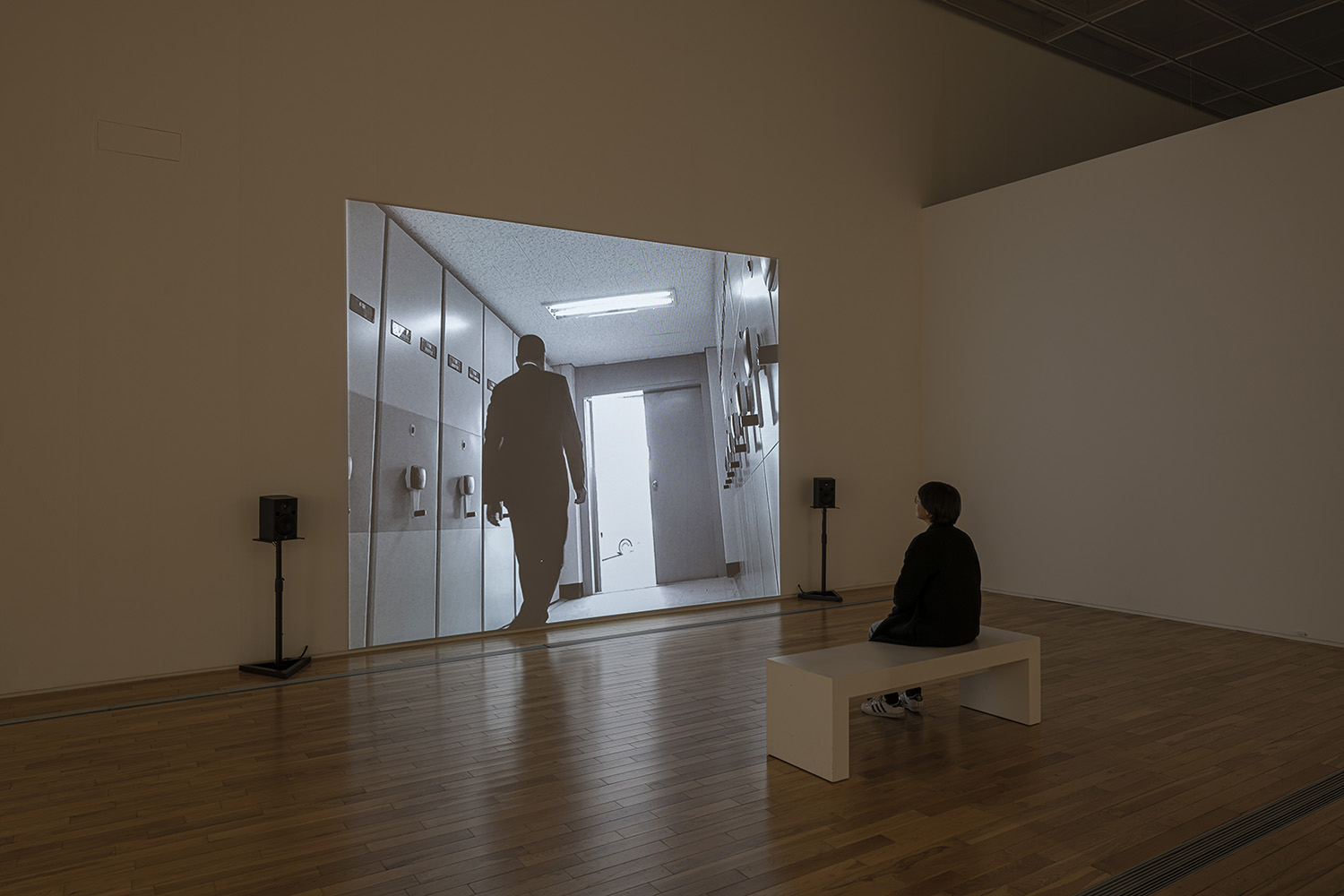 MMCA (KR)
MMCA (KR)
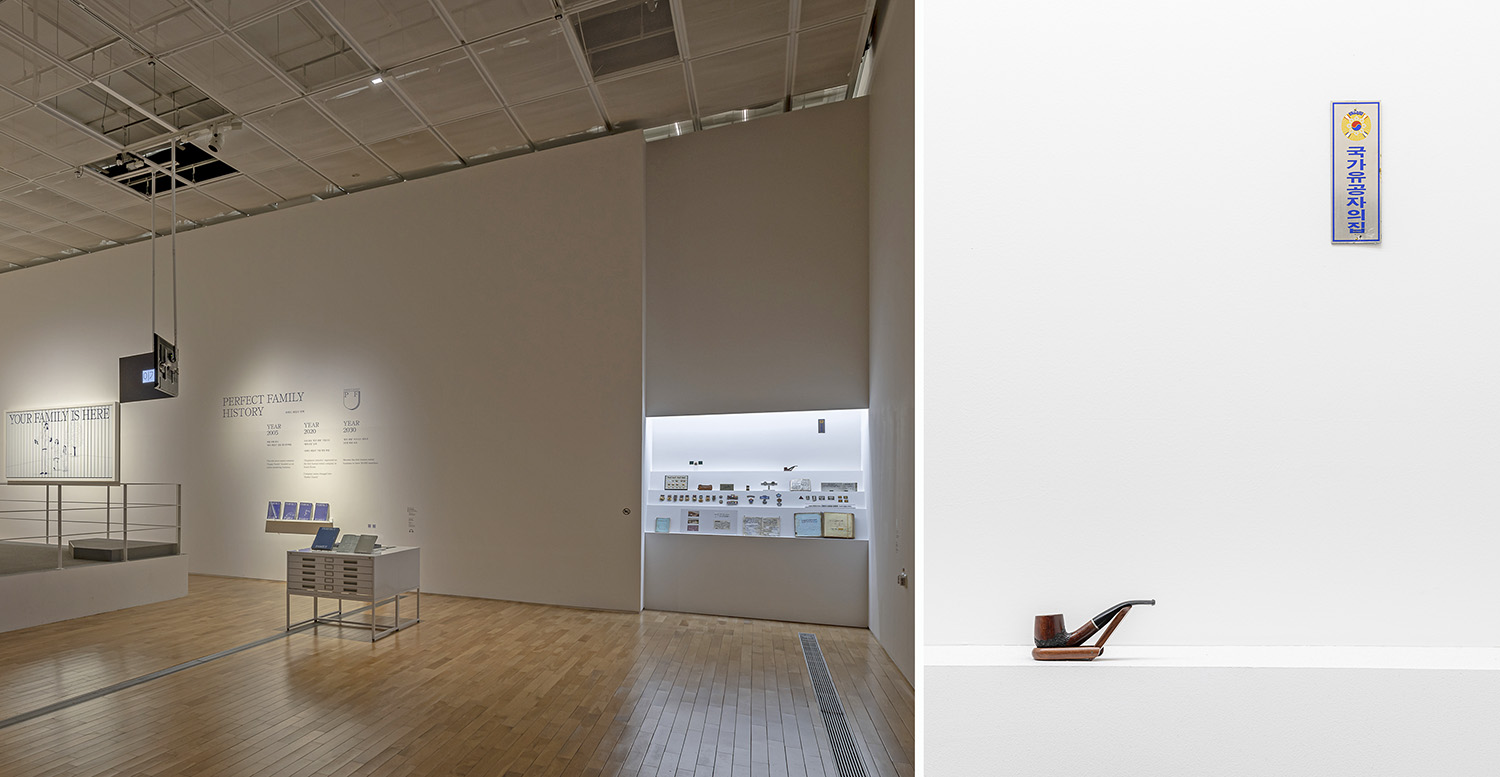
아카이브 '어느 국가 유공자의 죽음', 2019, 고독사 현장에서 수집된 유품
Archive 'A National Merit' Death', 2019, mementos collected at the site of a lonely death.
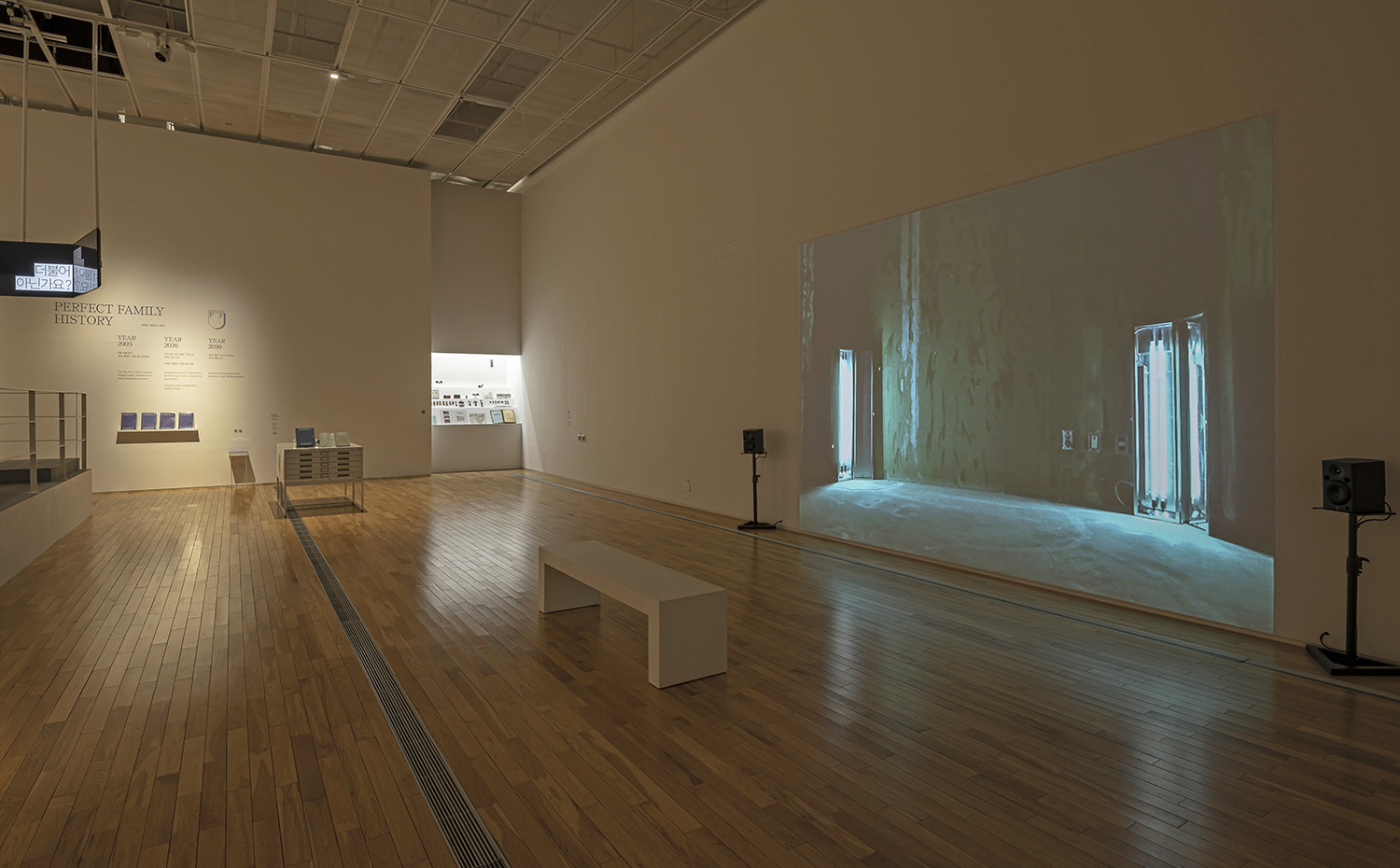
Human Rental Business 'Perfect Family' ▶
'Perfect Family' Tri-vision Billboard_300x150cm, MMCA Collection
작품 '㈜퍼펙트패밀리’는 이미 백여개의 업체가 존재하는 국내 역할대행업체들과 10여개의 일본 ‘가족 대여’ 사업들의 사업내용을 조사 한 뒤 만들어진 가상의 휴먼 랜탈 기업으로 사업을 소개하는 카탈록과 홈페이지 등 광고물, Wall Text 들이 포함된다.
국내의 100여개의 역할 대행사업 업체들은 이젠 장례식, 결혼식을 넘어서 대신 사과를 하거나, 면접을 보거나, 이별을 해주는 식의 개인이 책임져야 할 영역까지 해결하는 서비스로 발전하고 있다. 고령화, 1인 가구로 심각한 사회문제를 안고 있는 일본에선 이미 가족 대여사업들이 표면화됐으며 아직까지 음성적으로 존재하는 한국의 업체들이 평범하게 될 날도 멀지 않았다.
* 2020년 9월 '퍼펙트패밀리'의 자회사 '퍼펙트7'이 오픈했다. ▶
This type of business is commonly known for providing services for funerals and weddings, but currently, more than 100 human rental agencies have expanded their offerings to include more personal affairs such as apologies, job interviews, and breakups. As Japan has faced serious social issues resulting from an aging population and an increase in single-person households, the family rental business has already become widespread there. Similarly, in the near future, human rental agencies—which are still relatively covert in Korea—are likely to become a common phenomenon. Perfect 7, a subsidiary of Perfect Family, opened in September 2020.
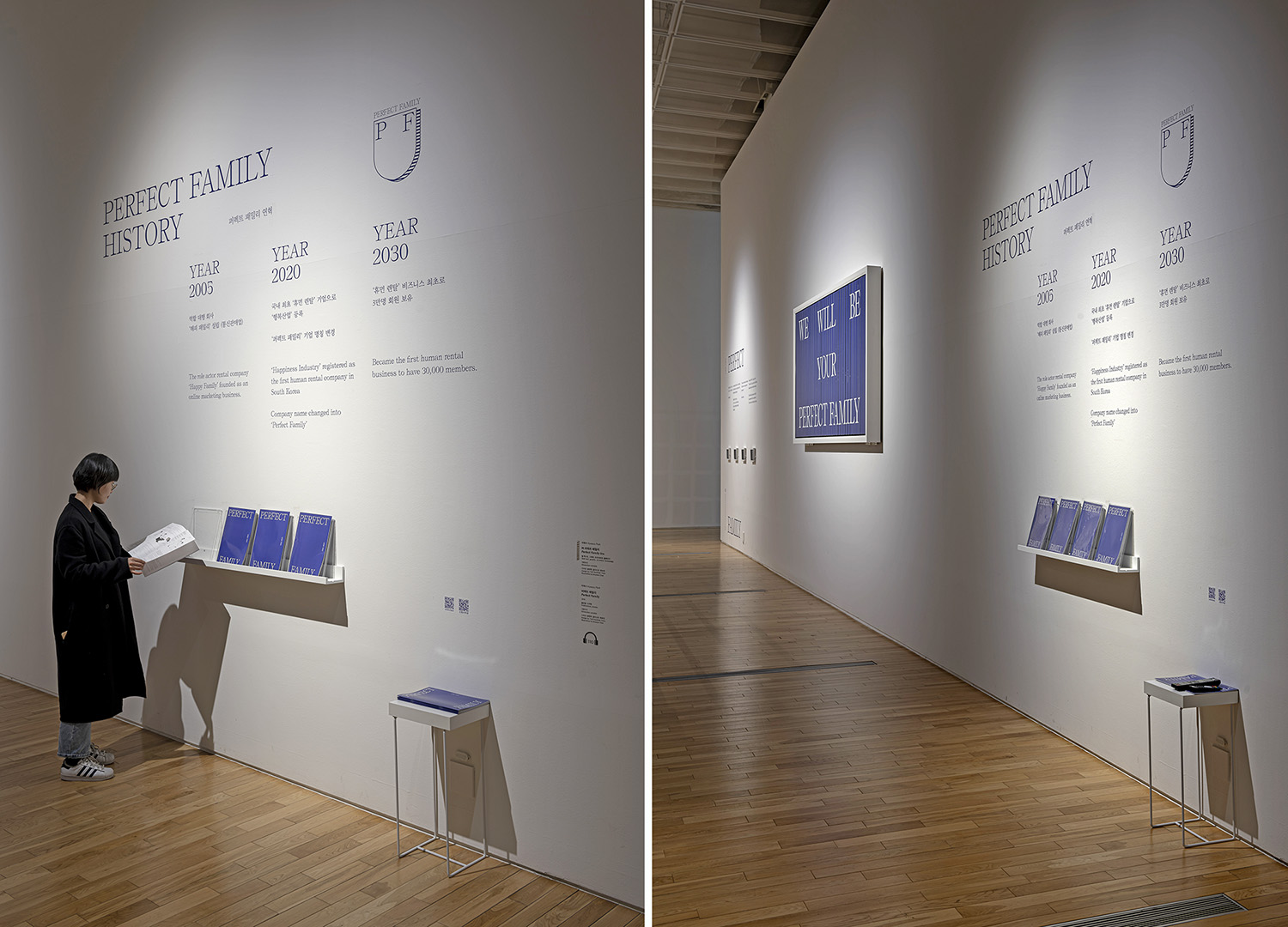
Perfect Family, Inc. is a fictitious “human rental” company created based on the service descriptions of 100 actual human rental agencies in Korea and 10 family rental agencies in Japan.
This project consists of a company catalog, website, advertisements, and wall text.
If Korean society continues to ignore the phenomenon of family avoidance and insists on maintaining an intensely family-centered structure, services like “Perfect Family” will inevitably become commercialized. This work serves as a warning for the future.
Based on approximately 200 service inquiries submitted during the five-month exhibition at MMCA Seoul, the project will be expanded to adapt some of these cases into a play, live film performances, metaverses, photography, etc. (▶more)

증발자들, 2024, 라이브필름 퍼포먼스, 90분, 콘텐츠문화광장 스테이지 66(서울), 라이브필름퍼포먼스 제작: 미디어스코프
The Evaporated People, 2024, 90min, KOCCA Stage66, Seoul, KR, Live Film Performance Production: Mediascope
Since 2019, Perfect Family has expanded into various genres, including performance, photography, metaverse, advertising videos, publishing, archives, web-surveys, and live film performances. For more information on these activities, please refer to Exhibition. ▶
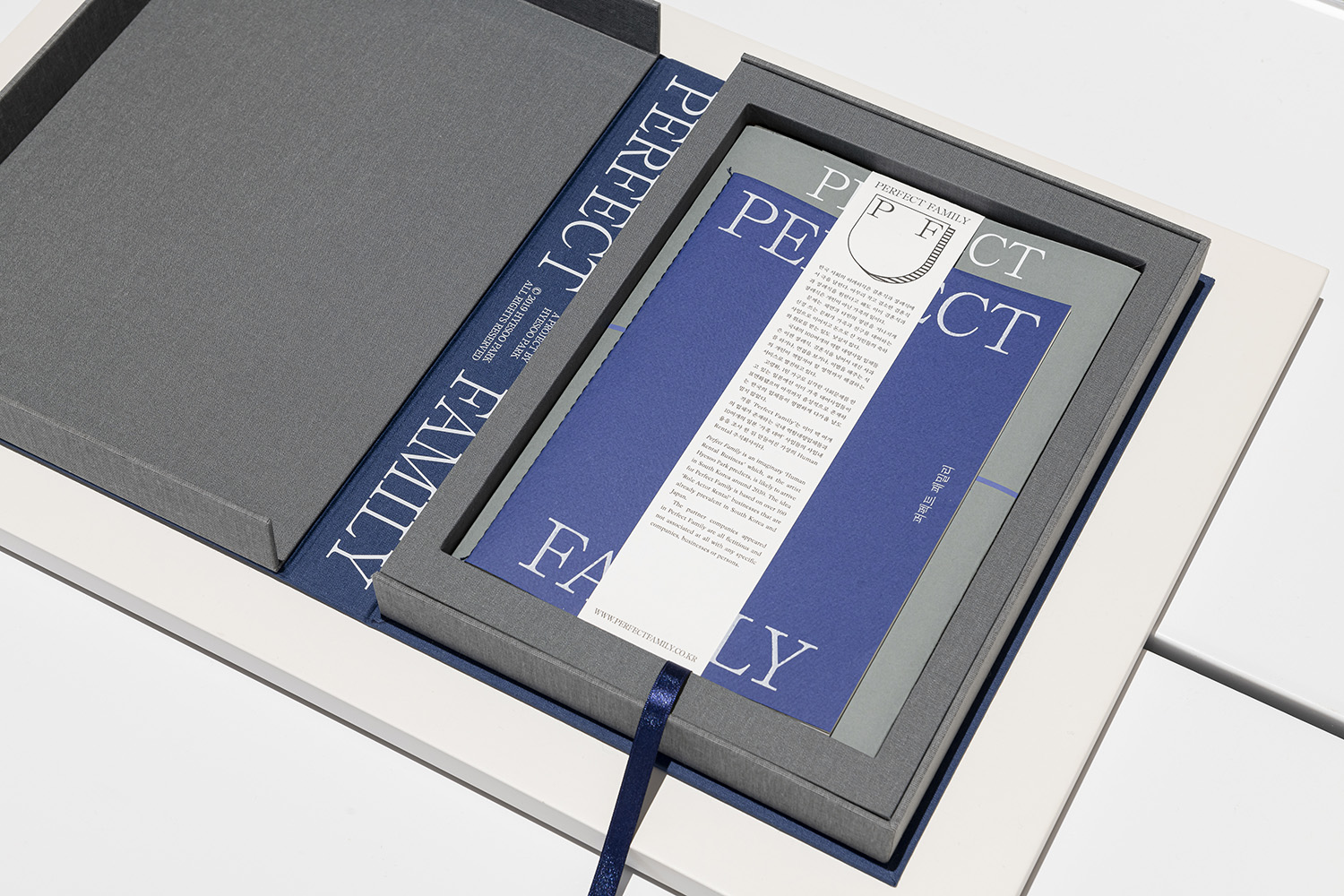 퍼팩트패밀리 주식회사, 출판(2종-리소, 실크스크린), 도면함, 가변크기, 디자인: 윤현학, 일러스트: 최보연, 국립현대미술관 소장
퍼팩트패밀리 주식회사, 출판(2종-리소, 실크스크린), 도면함, 가변크기, 디자인: 윤현학, 일러스트: 최보연, 국립현대미술관 소장
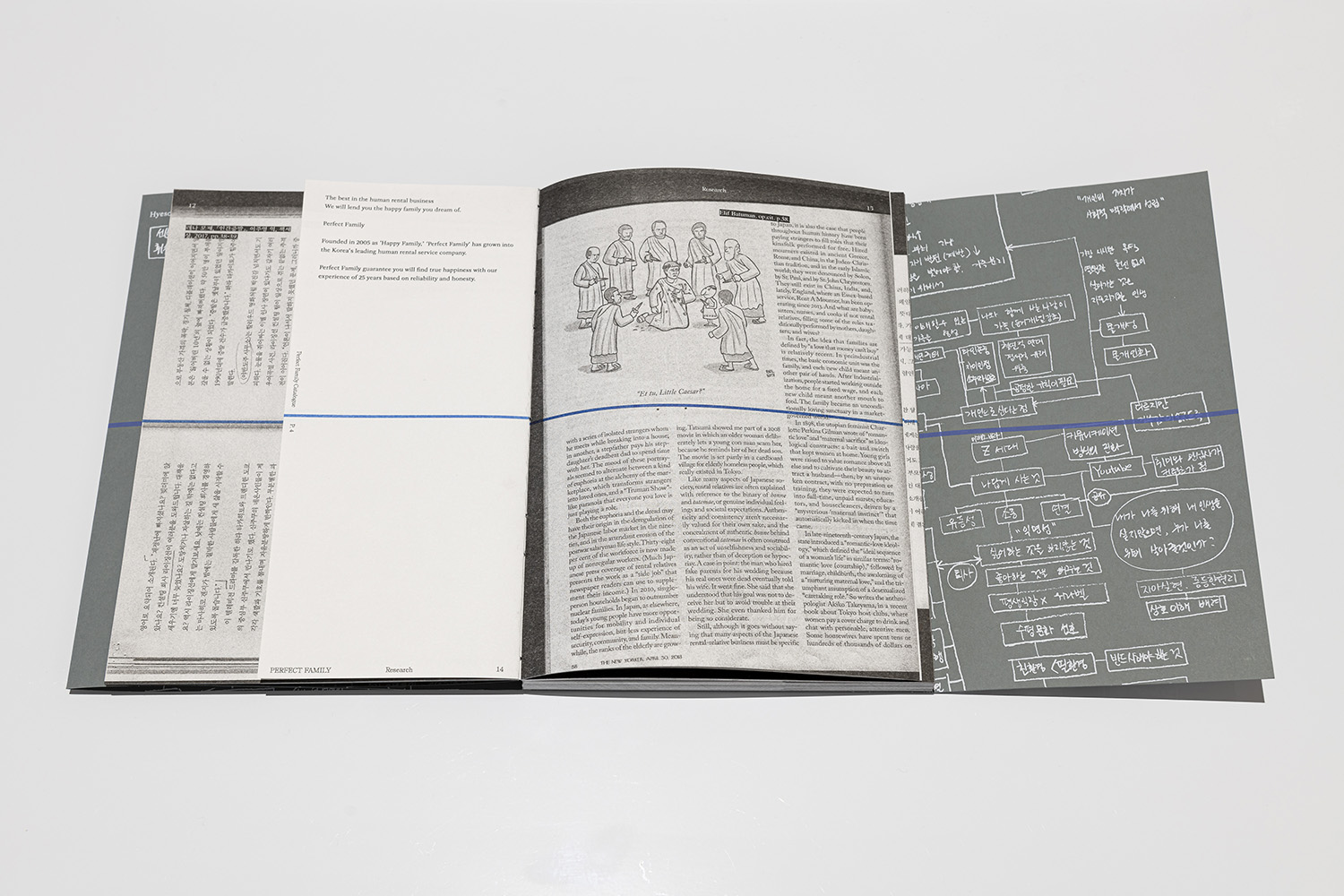
출판물 ’퍼팩트패밀리‘는 그러한 자료들까지 모두 합쳐진 일종의 모음집으로 휴먼랜탈 비즈니스가 도래할 수밖에 없는 결론을 작가가 내기까지의 자료들을 모아놓은 출판물이다.
가볍게 볼 수 있을 법한 카탈록 ’(주) 퍼팩트 패밀리‘는 현제 실제 행해지는 일들이자 여러 사회학자들이 경고하는 미래의 모습이다. '㈜퍼팩트패밀리'의 기업 홍보 카탈록은 한국과 일본의 역할대행회사(한국)과 가족 대여사업업체(일본) 100여 곳을 조사하고 관련 미래 사업을 예상하는 기사와 논문, 자료들을 바탕으로 하고 있다.
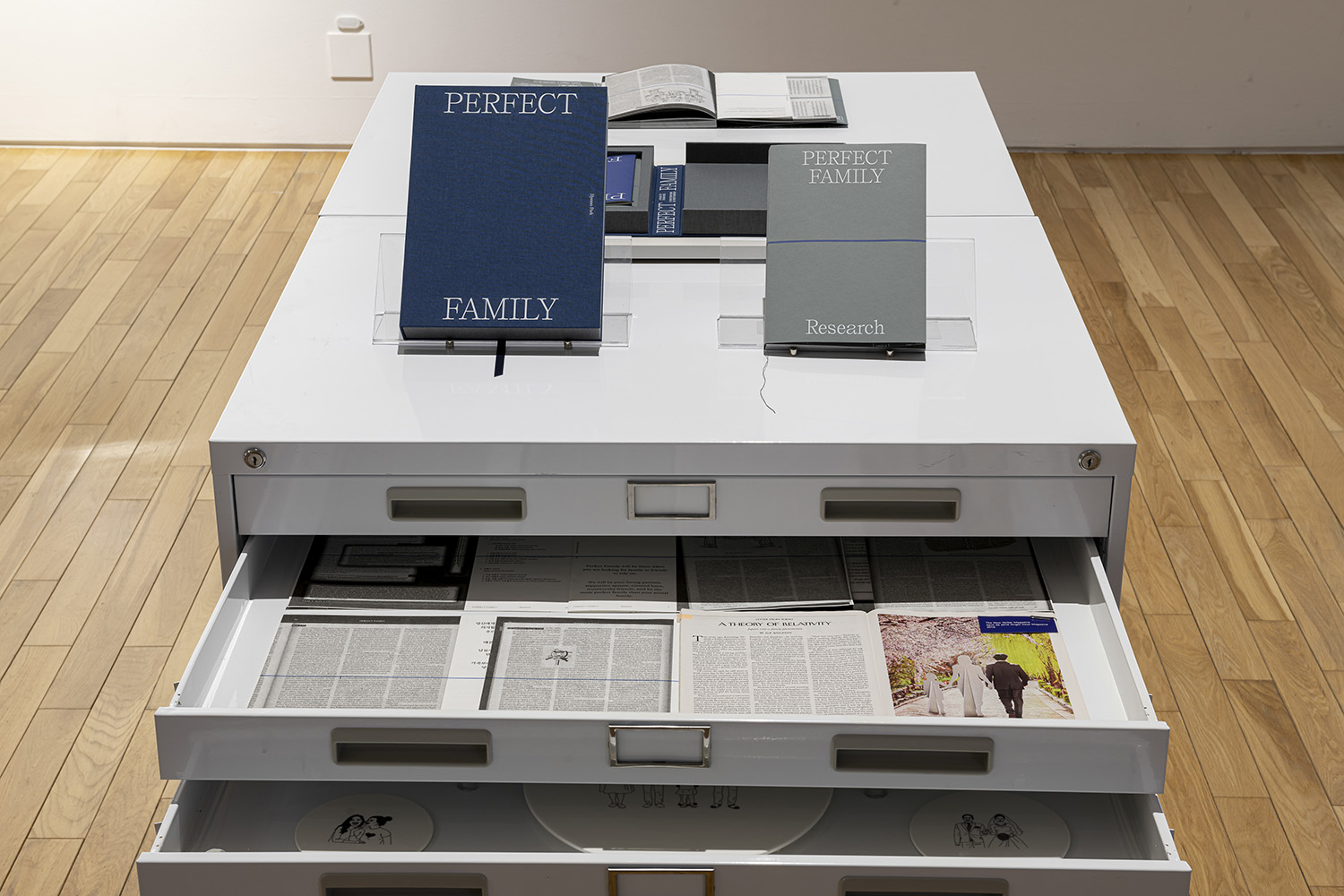
The company catalog for Perfect Family, Inc. is based on over 100 actual human rental agencies in Korea and Japan, as well as news articles, academic papers, and other sources that predict the growing prevalence of such businesses.
The published version of Perfect Family, Inc. is a compilation of the company catalog and research materials—including newspaper articles and academic papers—that provide the theoretical basis for this inevitable development.
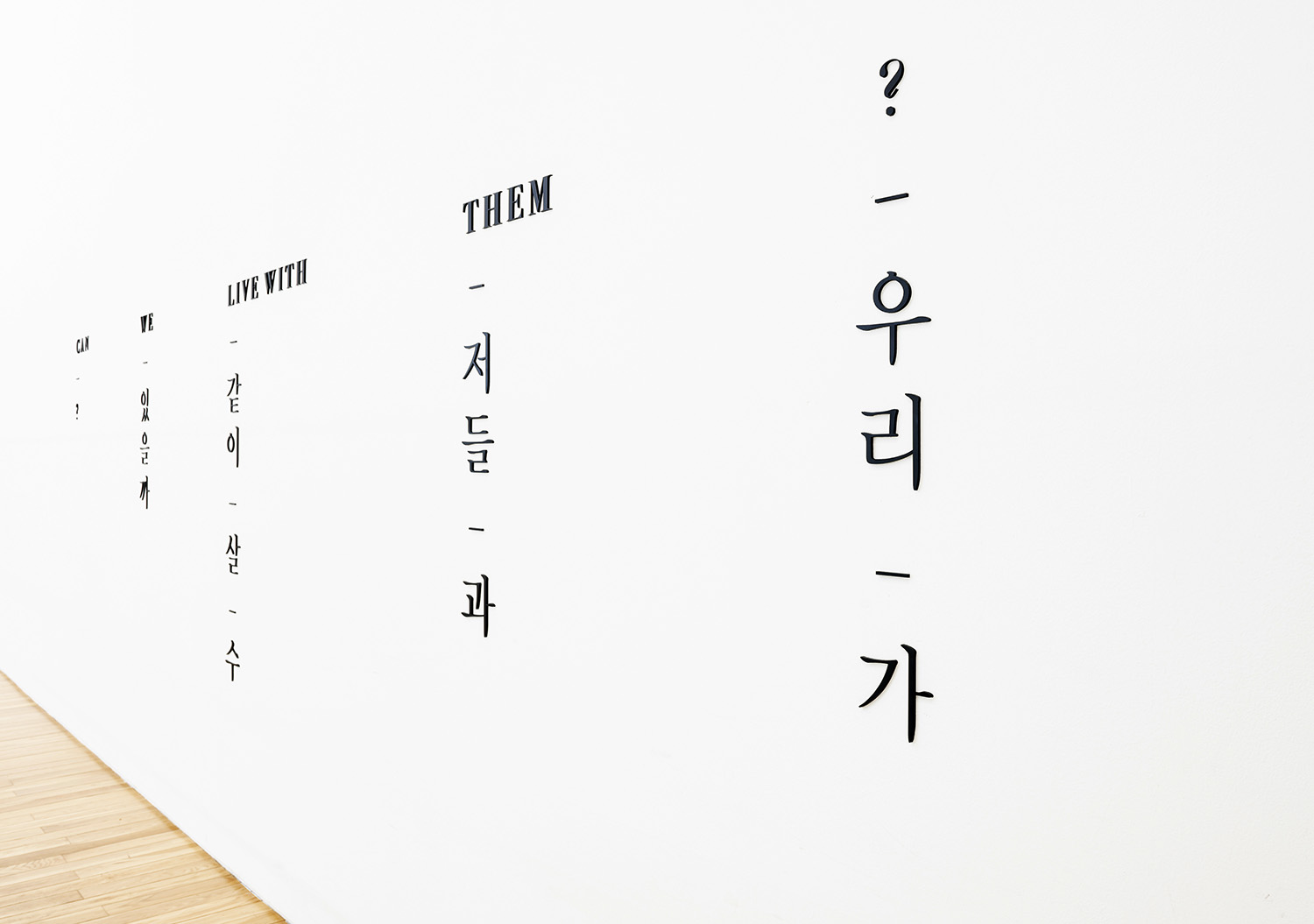 우리가 저들과 같이 살 수 있을까?, 2019, Text, 가변크기, 텍스트 디자인: 서문홍익
우리가 저들과 같이 살 수 있을까?, 2019, Text, 가변크기, 텍스트 디자인: 서문홍익
Can We Live with Them?, 2019, text work, text design by Seomoon Hong-ik
전시공간을 나가면서 작가가 관객에게 전하는 마지막 메시지는 ‘불안’에 대한 것이다.
어느 시대보다 공동체의 중요성이 강조되고 필요성이 대두되는 시대에서 간과되는 부분이 서로 다른 개인들이 낯선 타인과 ‘어떻게’ 같이 살 것인가에 대한 문제이다. 분명 다른 생각과 가치관과 문화를 가진 사람들이 낮은 울타리로 함께 살아야 하는 것이겠지만 안타깝게도 지금 우리는 신뢰의 공감대가 부족한 시대를 살고 있다. 감정을 불편함을 견디지 못하는 사람들이 늘어나고 집단이 자신을 지켜줄 걸란 믿음으로 자신을 존중하지 않은 집단에서 참고 산다. 타인의 고통을 회피하고 침묵하는 사람들..
우리가 저들과 함께 살 수 있을까.
Today, when the importance of community is emphasized more than ever, the question of how individuals interact with strangers is often overlooked. We know that people with different thoughts and values should be more tolerant of one another, but unfortunately, we live in a society that lacks trust and empathy.
More and more people find it unbearable to confront uncomfortable feelings, and individuals often tolerate disrespectful communities simply because they offer some protection from society. Many turn away from and remain silent about the pain of others.
Can we truly live alongside them?
